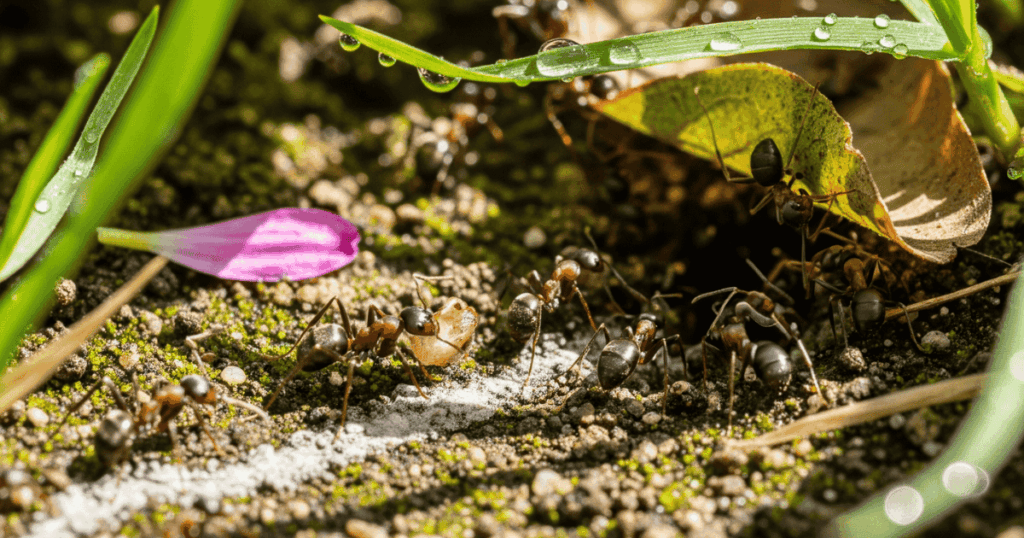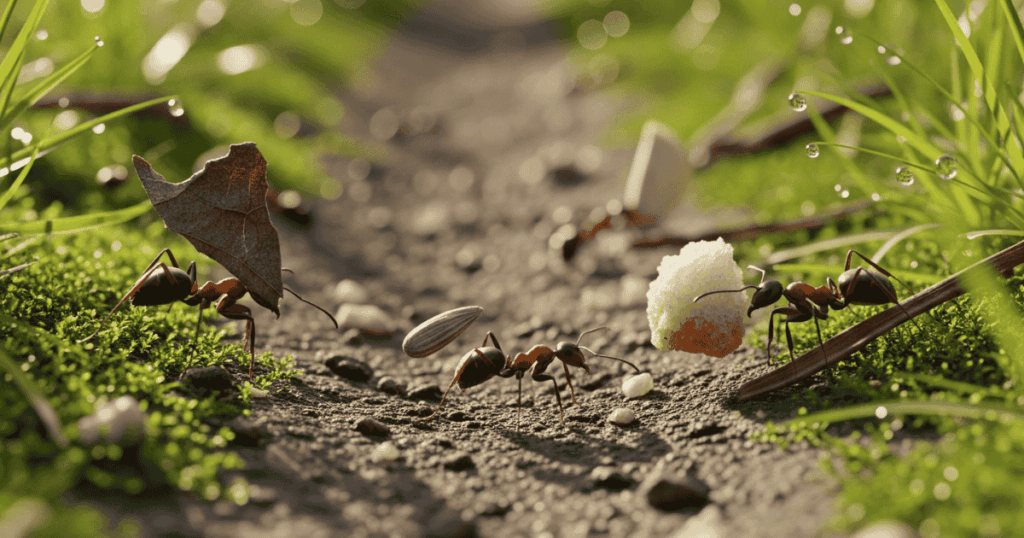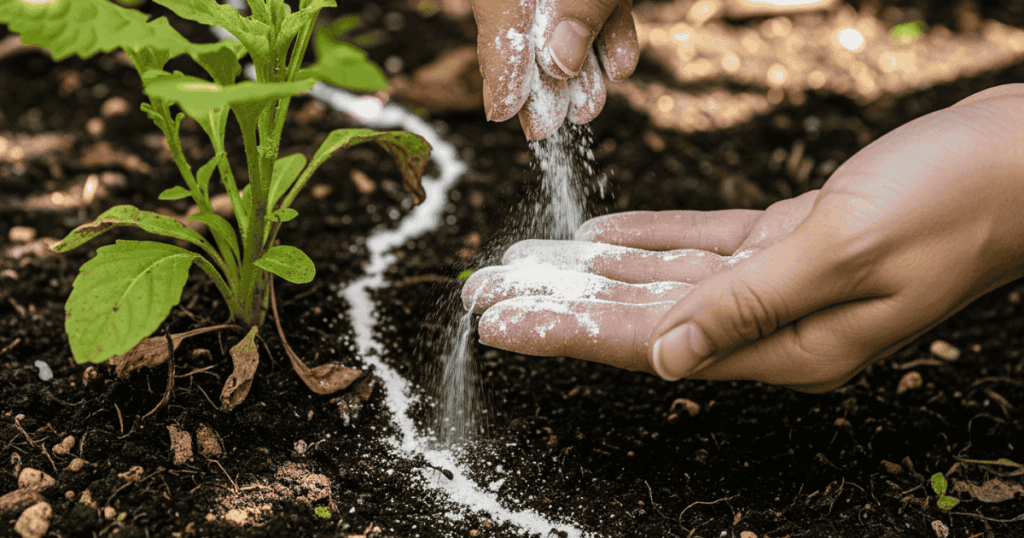Managing ant invasions in your garden can feel overwhelming, but understanding how to remove ants from garden spaces effectively will restore your outdoor sanctuary. These persistent insects often establish colonies near plant roots, disrupting growth and protecting harmful pests like aphids. Learning how to remove ants from garden areas naturally protects both your plants and the environment from harsh chemicals.
Whether you’re dealing with fire ants, carpenter ants, or common garden varieties, knowing how to remove ants from garden beds using proven methods will save your plants and maintain ecological balance. This comprehensive guide provides practical solutions that work without compromising your garden’s health.
Table of Contents
Why Ants Become a Problem in Gardens?

Ants are social insects, and when they build colonies in your garden, they multiply quickly. On one hand, they break down organic matter, but on the other, they encourage harmful pests. Learning how to remove ants from garden spaces begins with understanding why they’re attracted in the first place.
| Ant Attraction Factor | Why It Matters in Gardens |
| Presence of Aphids | Ants feed on honeydew secreted by aphids and scale insects. |
| Moist Soil | Damp areas provide nesting spaces for colonies. |
| Food Scraps | Compost piles or fallen fruits attract ants. |
| Uncontrolled Mulch | Thick, moist mulch creates hiding spots for ant nests. |
If you control these triggers, you can cut Ant invasion chances significantly before using stronger remedies.
Common Garden Ant Species
| Ant Type | Identifying Features | Primary Concerns |
| Fire Ants | Red-brown color, aggressive | Painful stings, plant damage |
| Carpenter Ants | Large, black bodies | Wood damage, structural issues |
| Pavement Ants | Dark brown, small nests | Soil disruption, root exposure |
| Field Ants | Various colors, large colonies | Aphid farming, plant protection issues |
How to Remove Ants from Garden Soil and Pots?

Ants often hide deeper in pots and soil, creating challenges for gardeners who want to understand how to remove ants from garden beds and potted plants. These hidden colonies disturb delicate plant roots, spread diseases, and make conditions unhealthy for seedlings.
Successfully tackling these pests in confined soil areas requires careful, safe approaches focused on how to remove ants from garden spaces without harming beneficial soil life. To achieve this, try the following solutions designed for garden pots and soil:
Cinnamon Powder Barrier:
Sprinkling cinnamon powder over the soil or around the pot rim is a reliable method for anyone learning how to remove ants from garden containers. The strong cinnamon scent drives ants out while keeping plants safe and chemical-free.
Soapy Water Flush:
Mix a mild dish soap with warm water, then carefully pour it into the soil. This soapy solution breaks down ants’ exoskeletons, offering an efficient answer to how to remove ants from garden pots without damaging delicate seedling roots when used in moderation.
Citrus Peels and Essential Oils:
Adding citrus peels or applying citrus-based essential oils (such as lemon or orange) not only freshens the soil but also naturally repels ant colonies. For those focused on how to remove ants from garden areas with fruit trees or raised beds, this method doubles as pest control and a soil conditioner.
| Soil Treatment | Best Use Case | Safety for Plants |
| Cinnamon Powder | Pots and raised beds | Safe and natural |
| Soapy Water | Direct root treatment | Use mildly to avoid root stress |
| Citrus Oils | General soil conditioning | Safe, also repels other pests |
These treatments ensure your garden soil restores balance while avoiding harmful chemicals.
Natural Methods on How to Remove Ants from Gardens?

Chemical sprays often harm soil health and plant roots. Instead, natural remedies show great results. When deciding how to remove ants from garden beds, prioritize safe and eco-friendly methods.
Boiling Water Treatment
The most immediate approach for how to remove ants from garden nests involves using boiling water directly on ant hills. This method provides instant results by eliminating ants on contact and collapsing tunnel systems.
Application Process:
- Locate all visible nest entrances throughout your garden
- Boil large quantities of water (2-3 gallons for major infestations)
- Pour directly into holes during peak activity hours
- Repeat treatments every 2-3 days until activity ceases
While effective, this method requires multiple applications since it rarely reaches entire colonies on the first attempt.
Vinegar Solutions
White vinegar is a reliable option for how to remove ants from garden areas, as its acidic environment disrupts ant communication and navigation systems by destroying the pheromone trails ants use for coordination.
Preparation and Application:
- Mix equal parts white vinegar and water in spray bottles
- Apply liberally around plant bases and ant trails
- Reapply after rainfall or every 3-4 days
- Focus on entry points and high-traffic areas
Cinnamon and Spice Barriers
Ground cinnamon acts as a natural deterrent for how to remove ants from garden spaces, overwhelming their sensory systems and disrupting navigation without harming beneficial insects or plants.
Effective Application:
- Sprinkle ground cinnamon in thick lines around protected plants
- Create barriers at garden bed perimeters
- Reapply after rain or heavy watering
- Combine with coffee grounds for enhanced effectiveness
Homemade Remedies for Long-term Control

Natural remedies provide sustainable and safe solutions for gardeners seeking long-term control of ants. These methods leverage everyday household items and non-toxic substances that eliminate or repel ants without harming plants or beneficial insects. Below is a summary of effective homemade treatments that combine safety and efficiency for ongoing ant management in garden spaces.
Diatomaceous Earth Application
Food-grade diatomaceous earth is a proven solution for how to remove ants from garden spaces, providing long-lasting, toxin-free protection by damaging ant exoskeletons with microscopic cutting action.
Safe Application Guidelines:
- Use only food-grade varieties to protect beneficial insects
- Apply thin, even layers around affected areas
- Reapply after rain or irrigation
- Wear protective masks during application to avoid inhalation
Essential Oil Deterrents
Several essential oils create natural barriers that repel ants while adding pleasant fragrances to garden spaces. These oils work by disrupting ant communication and making areas uninhabitable for colonies. Using essential oils is an effective method for how to remove ants from garden areas, combining pest control with a fresh garden aroma.
Natural Deterrent Comparison
| Method | Effectiveness Duration | Plant Safety | Reapplication Frequency |
| Cinnamon | 3-5 days | Excellent | After rain |
| Vinegar | 2-3 days | Good (test first) | Every 3 days |
| Coffee Grounds | 1 week | Excellent | Weekly |
| Essential Oils | 4-6 days | Very Good | Every 5 days |
Borax-Based Baits (Use with Caution)
For severe infestations, borax mixed with sugar creates an effective ant bait that eliminates entire colonies. Worker ants carry the mixture back to nests, affecting queens and larvae. This approach is a reliable method for how to remove ants from garden areas by targeting the colony directly and providing long-lasting results.
Safety Considerations:
- Keep away from children and pets at all times
- Place baits in protective containers or stations
- Remove after 1-2 weeks or when ant activity stops
- Never apply directly to soil or plant surfaces
Prevention Strategies for Garden Ant Control

While learning how to remove ants from garden areas is vital, prevention is equally important. Once ants establish nests, complete eradication becomes more difficult. By applying preventive steps consistently, you minimize future infestations.
Soil Management Techniques
Proper soil management plays a key role in how to remove ants from garden areas by reducing conditions that attract ant colonies. Well-draining soil discourages ants from establishing nests while also maintaining overall plant health, making your garden less inviting to these pests.
Soil Improvement Methods:
- Add coarse sand or perlite to heavy clay soils
- Ensure proper drainage around plant bases
- Avoid overwatering that creates consistently moist conditions
- Remove decaying organic matter that attracts foraging ants
Companion Planting Solutions
Strategic plant selection is a practical approach for how to remove ants from garden areas naturally while supporting biodiversity. Many aromatic herbs and flowers, such as rosemary, lavender, and mint, contain compounds that ants actively avoid, creating natural barriers in your garden.
Effective Ant-Repelling Plants:
- Mint varieties (peppermint, spearmint)
- Lavender and rosemary
- Tansy and catnip
- Garlic and chives
Garden Hygiene Practices
Maintaining clean garden spaces is an essential step in how to remove ants from garden areas effectively. By removing food sources and nesting materials regularly, you prevent ants from establishing colonies, stopping small problems from becoming major infestations and keeping your garden healthy and pest-free.
Essential Maintenance Tasks:
- Remove fallen fruits and vegetables promptly
- Clean up spilled seeds from bird feeders
- Eliminate standing water sources
- Trim vegetation away from structures
Monitoring and Maintenance
Successful ant control requires ongoing vigilance and regular monitoring of garden conditions. Early detection is a crucial part of how to remove ants from garden areas effectively, as it prevents small ant populations from establishing major colonies that can cause widespread damage. Regular checks help catch infestations early and allow for timely treatment before the problem escalates.
Effective Monitoring Practices:
- Weekly inspections of garden beds and plant bases
- Tracking ant trails to locate nest entrances
- Documenting treatment effectiveness and timing
- Adjusting strategies based on seasonal activity patterns
Common Mistakes to Avoid When Removing Ants From Garden
Often gardeners unintentionally worsen the problem when handling ants. To use the right approach, avoid these common errors while deciding how to remove ants from garden soil and beds.
- Overusing Chemical Sprays: They can harm pollinators like bees and butterflies.
- Ignoring Aphids: Without controlling the root cause, ants will return.
- Flooding the Garden: Excess water kills plants more often than ants.
- Using Sweet Baits Excessively: They might initially attract more ants.
- Not Repeating Treatments: Colonies are resilient, and a one-time effort rarely works.
Understanding these mistakes prevents wasted effort and ensures your garden remains healthy while staying ant-free.
Seasonal Ant Activity Patterns
| Season | Activity Level | Primary Concerns | Recommended Actions |
| Spring | High | Colony establishment | Prevention focus |
| Summer | Peak | Foraging, reproduction | Active treatment |
| Fall | Moderate | Winter preparation | Cleanup, barriers |
| Winter | Low | Dormancy | Planning, preparation |
When to Seek Professional Assistance?
Sometimes, despite best efforts to learn how to remove ants from garden spaces naturally, professional intervention becomes necessary. Certain situations require expertise and specialized equipment beyond typical homeowner capabilities.
Indicators for Professional Help:
- Colonies covering large garden areas (over 100 square feet)
- Recurring infestations despite multiple treatment attempts
- Presence of aggressive species like fire ants
- Structural damage from carpenter ant activity
- Allergic reactions to ant stings or bites
Professional pest control specialists can identify species accurately and recommend targeted treatments while minimizing environmental impact.
For comprehensive and hassle-free ant removal and long-term pest prevention, trust the professionals at Antipest Office. Visit us at the Antipest Office, Our trained technicians use safe and effective methods to protect your home and business. For service bookings and consultations, call us at +91 9819018398 .
Conclusion
Learning how to remove ants from garden spaces successfully requires patience, persistence, and the right combination of natural methods. The most effective approach combines immediate treatments like boiling water or vinegar solutions with long-term prevention strategies including proper soil management and companion planting. Understanding how to remove ants from garden areas without harmful chemicals protects beneficial insects while maintaining ecological balance.
Remember that knowing how to remove ants from garden beds effectively often involves addressing underlying conditions like moisture problems and aphid infestations. With consistent application of these proven methods, you can reclaim your garden from ant invasions while creating a thriving environment for your plants and beneficial wildlife.
How to Remove Ants from Garden? – FAQs
How to remove ants from garden naturally?
Use natural repellents like vinegar spray, cinnamon powder, or boiling water directly on nests to remove ants from garden without harming plants.
How to remove ants from garden soil effectively?
Treat garden soil with soapy water, sprinkle cinnamon or coffee grounds, and keep soil dry to effectively remove ants from garden soil.
How to remove ants from garden pots safely?
Spray diluted vinegar or use cinnamon powder in pots; avoid harsh chemicals to safely remove ants from garden pots without harming plants.
How to remove ants from garden permanently?
Control aphids, maintain clean soil, use natural bait like baking soda with sugar, and regularly treat ant trails to remove ants from garden permanently.
How to remove ants from garden without chemicals?
Use homemade remedies such as vinegar spray, boiling water on nests, cinnamon barriers, and natural ant baits to remove ants from garden without chemicals.
How to remove ants from garden using vinegar?
Mix equal parts vinegar and water in a spray bottle, then spray on ant trails and nests to remove ants from garden using vinegar effectively.
How to remove ants from garden mulch?
Reduce mulch thickness, keep mulch dry, and apply natural repellents like coffee grounds or cayenne pepper to remove ants from garden mulch.
How to remove ants from garden beds fast?
Pour boiling water on visible nests and spray vinegar solution on trails to remove ants from garden beds quickly and safely.
How to remove ants from garden safely around plants?
Use natural remedies such as mild soapy water, cinnamon powder, and citrus peels that remove ants from garden safely around plants.
How to remove ants from garden and prevent return?
Remove aphids, keep soil dry, clean fallen debris, and use natural ant deterrents regularly to remove ants from garden and prevent their return.

